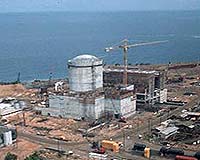 |
Brussels (AFP) March 21, 2011 European Union states will ask neighbours such as Russia to conduct nuclear reactor "stress tests" similar to their own, re-examining safety in the light of the Japan crisis. At emergency talks on safety and supply issues in the wake of the Japanese earthquake and tsunami that triggered radiation leakage, the EU's energy commissioner, Germany's Guenther Oettinger, warned that "security goes beyond borders". While no firm decisions were taken on a new, voluntary safety testing regime across the EU -- other than to task the European Commission with their detailed design and implementation by the end of the year -- those present urged near-neighbours to follow suit. "We all want security to be as strong as possible, even outside the European Union," Oettinger said, pleading for revised security norms to be taken on board "by our main neighbours" in the field, notably Russia, Ukraine, Switzerland and Turkey, albeit Ankara is still in a development phase. European memories of the Chernobyl disaster in Ukraine in 1986 remained vivid even before the accident at the Fukushima No.1 plant in Japan. Risks from earthquakes, floods and tsunamis as well as "plane crashes and cyber attacks", and their effects on cooling systems, electricity power feeds and operational safety, were listed among a "common checklist" of contingencies for which fresh back-up planning is now required. Oettinger said "very strict" tests to be set up would "serve as a basis for discussion with non-EU states". "We can also make a similar (invitation) to our neighbouring partners outside the EU with their plants," stressed Tamas Fellegi, the chair of the talks, Hungarian minister for national development. Lithuania's Andronius Azubalis, whose country is concerned that plants just "kilometres" (miles) from the EU's borders are in "violation" of international standards, said the EU should push for those near its borders to match new evaluations. Non-nuclear Austria has long expressed anxiety over plants in nearby ex-communist Czech Republic and ex-Yugoslav Slovenia. Austrian economy minister Reinhold Mitterlehner said it was regrettable that "for the moment, there is no unified line" on criteria even just within the EU. The as-yet voluntary nature of the testing envisaged also caused problems for some. German Economy Minister Rainer Bruederle wanted the EU tests to be "obligatory", after weekend elections gave Chancellor Angela Merkel's party a wake-up call despite the temporary shutdown of Germany's seven oldest reactors pending a safety review there. But Energy Minister Eric Besson said France, home to 58 of the EU's 143 reactors, was already "at the forefront in safety matters" with "a nuclear safety authority that is extremely demanding, and whose (political) independence is not in doubt". France will conduct its own "general review of all our reactors, all our plants, in the light of what happened in Japan", he said. Belgium's Paul Magnette, meanwhile, said it was paramount that eventual test results be conducted by "independent regulators" and made fully public. "We are committed to publishing the results and acting on the consequences of these results," he said. "That means closing a reactor if the result is unsatisfactory," he underlined.
Share This Article With Planet Earth
Related Links Nuclear Power News - Nuclear Science, Nuclear Technology Powering The World in the 21st Century at Energy-Daily.com
 ASEAN 'more cautious after Japan nuclear crisis'
ASEAN 'more cautious after Japan nuclear crisis'Singapore (AFP) March 21, 2011 Japan's nuclear crisis is likely to prompt Southeast Asian states to look more carefully at their plans to tap atomic energy for power generation, the head of the regional bloc said Monday. Association of Southeast Asian Nations (ASEAN) secretary-general Surin Pitsuwan said Japan's struggle to prevent a reactor meltdown at the Fukushima nuclear power plant will have a "psychological" impact ... read more |
|
| The content herein, unless otherwise known to be public domain, are Copyright 1995-2010 - SpaceDaily. AFP and UPI Wire Stories are copyright Agence France-Presse and United Press International. ESA Portal Reports are copyright European Space Agency. All NASA sourced material is public domain. Additional copyrights may apply in whole or part to other bona fide parties. Advertising does not imply endorsement,agreement or approval of any opinions, statements or information provided by SpaceDaily on any Web page published or hosted by SpaceDaily. Privacy Statement |